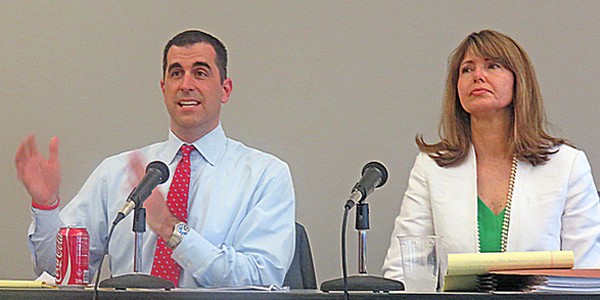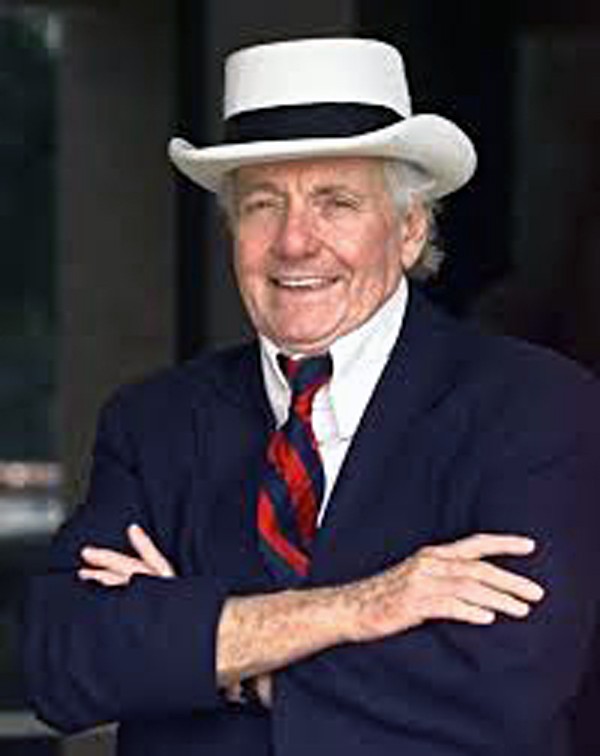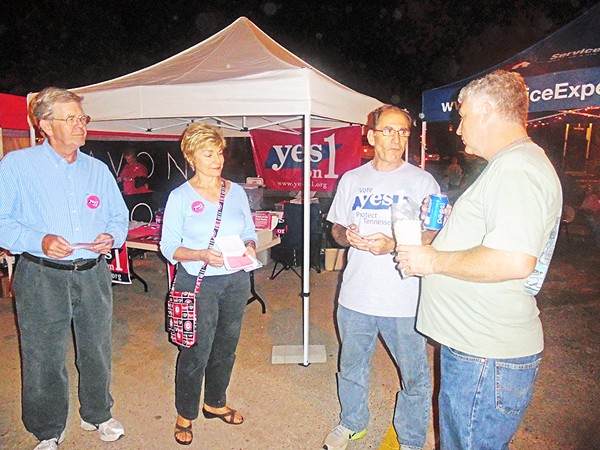The Flyer recently highlighted several referenda for Memphis voters on the November 5th election ballot. This week, which will see the onset of early voting (October 16th through October 31st), we look at partisan contests in several key races.
Legislative Races
Noah Nordstrom, tall, stately, with long blonde hair he ties into a bun, says people tell him he looks like Trevor Lawrence, the ex-Clemson quarterback who now pilots the Jacksonville Jaguars of the NFL. “Either that or Thor,” Nordstrom says. “I’ll take either one.”
Images aside, Nordstrom is paradoxically mild-mannered and not macho at all, indeed somewhat diffident, as befits his day job as a public school teacher.

What else he hopes to take is the title of state representative for Tennessee’s District 83, an enclave that straddles the southeastern rim of Shelby County and the western edge of Germantown. Challenger Nordstrom, a Democrat, has his work cut out for him. The seat has been held since 2010 by Republican Mark White, a fixture in the state GOP’s legislative supermajority in Nashville and the chair of the House Education Committee.
Education, as it happens, is also the central concern of Nordstrom, who teaches Spanish at Overton High School and is sounding the alarm about what he calls the “radical” ideas of the current legislative Republican supermajority. The specific moment that galvanized him into running came, he says, “when I realized that my state representative, Mark White, is pushing the voucher bill.”
That bill, a main priority of GOP Governor Bill Lee, is described by Nordstrom as “a proposal that would defund our public schools across the entire state of Tennessee.” A bit of an exaggeration, perhaps, but the premise of the proposed legislation is that substantial amounts of taxpayer money would be siphoned out of the general fund to provide tuition at private schools, which, arguably, are in direct competition with the long-established public school system.
“I live just over on the Memphis side [where] Memphis has set up against it completely,” said Nordstrom. Also, as he notes, “The leaders here in Germantown, the entire school board, and the mayor stood up and said, you know, we don’t want this. … Even the Republican-leaning communities don’t want it. And so I decided to throw my name in.”
Indeed, opposition to school vouchers is universal in Shelby County school circles, not only in the urbanized Memphis-Shelby County Schools, but in each of the six county municipalities — Germantown, Collierville, Bartlett, Lakeland, Arlington, and Millington — that won the right to establish their own public school districts during the school merger controversy of the county’s previous decade.
Opposition to vouchers is one of the key wedge issues, along with demands for gun safety, also linked to public schools, that Democrats — presumed to be a minority in District 83, as they certainly are in the state at large — hope can support a political comeback for the party.
“We can do better for our kids, and so that’s been one of the main issues,” Nordstrom said at the Future901-sponsored meeting, held in a Germantown household, where he recently spoke his views. “Obviously one of the other major ones is gun violence. It’s overwhelming to realize that you might not be able to save some of these kids. We see it every day, wondering whether they’re going to make it home safe.”

Unforgotten is the “good trouble” of spring 2023, when mass protests were held at the state Capitol following a lethal episode of gun violence at a Nashville school. In the aftermath, three Democratic House members, including Justin J. Pearson of Memphis and Gloria Johnson of Knoxville, a candidate this year for the U.S. Senate, were held to accounts by the Republican majority for their passionate support of protesters’ demands for gun safety legislation.
Pearson was expelled by the vengeful majority, along with Justin Jones of Nashville, the third member of the “Tennessee Three.” Johnson survived expulsion by a single vote. All three were celebrated nationally for their stands, and Pearson and Jones were hastily returned to office in special elections.
Realistically, Democrats don’t envision any immediate regaining of the hegemony the party held for much of Tennessee’s history, but they do hope to achieve at some point a competitive status with the Republicans, who established their dominance in the statewide election years of 2010 and 2014 and have never looked back.
At the Future901 meeting in Germantown, there was a fair amount of partisan bear-baiting of Republicans, to be sure, but there were also expressions of concern regarding the increasing takeover of the GOP by MAGA ideology and a corresponding erosion, as attendees saw it, of commonsense shared values among Republican office-holders.

White, Nordstrom’s opponent, and state Representative John Gillespie, the incumbent Republican in House District 97, were specifically cited as case studies of GOP moderates shedding their scruples, or at least trimming them at the edges, while going along to get along with the MAGA-minded majority.
As Nordstrom noted, “Now the gun lobby is so strong they say, ‘Don’t vote our way and we’ll find a candidate for the primary, and we’ll pick you out.’ And that’s part of the reason why Mark White has gotten so much more radical. You know, at one point he opposed getting rid of the permitting system for concealed carry. And last year, he voted to arm teachers, and that’s because he knows they” — members supported by the gun lobby — “are comfortable.”
Democratic activist Diane Cambron, an attendee, concurred: “That’s one of the reasons why [District 96 Democratic state Representative] Dwayne Thompson is not running for reelection. He didn’t run for reelection this time because, according to him, when he first got elected in 2016 there were some moderate Republicans with whom he could work, but every year, those moderate Republicans drop out, they don’t run, and they’re replaced by younger, more radical Republicans, and that is what our Republican legislature is becoming. Even though they have a majority, they’re getting more and more radical all the time. There are very few moderate Republicans left.”
It should be said that White, the criticism notwithstanding, is widely regarded as being able to work across party lines. And, as the old joke has it, White can cry all the way to the bank. As is the case with most incumbents, especially well-heeled establishment figures, his cash receipts dwarf those of opponent Nordstrom, a first-time candidate.
His Education Committee chairmanship is consistent with his background in that, before attaining some success with a party-favor business, he was an elementary school teacher and a principal. He co-founded something called the Global Children’s Educational Foundation, which provided financial assistance and educational opportunities to impoverished children in Panama. And he won the Tennessee Community Organizations’ Legislator of the Year award in 2016 and the Tennessee CASA Association’s Legislator of the Year award in 2012.
He is no slouch, no easy target.
All of which is to say that Noah Nordstrom and the Democrats will have their hands full in District 83. They remain hopeful, though, that they can build on the incremental success they began in 2016 — ironically the year of Donald J. Trump’s win over Hillary Clinton nationally. The victory in 2016 of the aforementioned Dwayne Thompson over incumbent Republican Steve McManus in District 96 was just as much of an upset locally. As then constituted, District 96 also straddled city and county lines and the accustomed bailiwicks of either party.

So does House District 97, where the case can be made that Democratic challenger Jesse Huseth might even be regarded as a favorite over incumbent Republican John Gillespie. The two opponents have raised approximately the same amount of money, each with cash on hand of just under $100,000, and, as currently configured, the district lines encompass a territory where Democrat Jason Martin, a distant second to incumbent GOP Governor Bill Lee virtually everywhere statewide, actually out-polled Lee. And the same can be said of Joe Biden in his presidential race against Trump.
The district’s current configuration remains one of the mysteries of Election Year 2024, since Gillespie, as a member of the GOP supermajority, had the opportunity to call the shots during the redistricting that followed census year 2020. And he decided to discard two Republican-dominated county precincts in return for two politically ambivalent ones further west in Memphis proper, presumably lowering his chances for reelection.
There has yet emerged no satisfactory explanation for Gillespie’s decision. One theory is that, as someone not regarded as slavishly partisan, he fretted over the prospect of being challenged in this year’s primary by a MAGA type in the formerly configured district. Another is that he was determined to prove that he could still win the more problematic district as a presumed Republican moderate — one who conspicuously deviated from GOP orthodoxy on the issue of guns, among other issues. Yet a third theory is that Gillespie simply wishes to represent the concerns of Memphis’ Poplar Corridor business community.
In any case, the District 97 race is regarded statewide as something of a coin-flip race — a test case of sorts regarding future partisan tendencies and the Democrats’ best chance of altering the current statistical ratio in the House, which stands at 75 Republicans and 24 Democrats.
The race could hinge on the two candidates’ contrasting positions on crime, which reflect an ongoing showdown between state and city. Huseth is a strong supporter of three referenda on the Memphis ballot that seek citizen support for “trigger” laws that would allow possible local reinstitution of gun permit requirements, the banning of assault rifle sales, and the imposition of “red flag” laws allowing judges to confiscate firearms from likely offenders. The Democratic candidate is an adherent as well of District Attorney General Steve Mulroy’s call for a new Memphis crime lab that would facilitate detection and prosecution of violent crime.
Gillespie has allied himself with state Senator Brent Taylor, a declared foe of Mulroy, in aggressive sponsorship of legislation strengthening anti-crime penalties and counteracting local options on matters of sentencing. Gillespie authored a bill striking down the Memphis City Council’s ban of “preemptive” traffic stops based on minor infractions.
Partisan races exist in several other legislative districts, where the incumbents are heavily favored. The contests are: Democratic incumbent Larry Miller vs. Republican Larry Hunter in House District 88; Democratic incumbent G.A. Hardaway vs. Republican Renarda Renee Clariett in District 93; Democratic incumbent Antonio Parkinson vs. the GOP’s Cecil Hale in District 98; and Republican incumbent Tom Leatherwood vs. Democrat William P. Mouzon in District 99.
U.S. Senate
Democrats have not come out ahead in a statewide race in Tennessee since then-Governor Phil Bredesen fairly handily won reelection in 2006. By the time Bredesen was next on the ballot, in a race for the U.S. Senate in 2018, he was defeated with equal ease by arch-conservative Republican state Senator Marsha Blackburn.
Nothing more clearly indicates the sea change in Tennessee partisan politics which occurred in the meantime, with the rapid shift of Tennessee from the status of a bellwether state to one in which Republican domination of state affairs had become a given.
Blackburn is up for reelection this year, and Democratic hopes are vested in the aforementioned Gloria Johnson, who won prominence as a member of the “Tennessee Three,” the Democratic House members who drew the ire of the Republican leadership for their assertive support of gun safety protesters in 2023.
Both Blackburn and Johnson have well-deserved reputations for intense partisanship, with Blackburn being a mainline supporter of former President Donald J. Trump, of strong action against illegal immigration, and of MAGA causes in general, and Johnson being equally vigorous in espousal of Democratic positions on such matters as reproductive freedom and climate change. She has clashed repeatedly with Republicans in the legislature and, after being gerrymandered out of one state House seat by the GOP supermajority, returned to the General Assembly as the representative of another.
Efforts by Democrats and others to arrange debates between the two candidates have so far foundered on a confident and financially well-endowed Blackburn’s reluctance to entertain them, but various polls have suggested that underdog Johnson, beneficiary of a recent fundraiser at the Annesdale Mansion in Memphis, may be within striking distance.
Congressional Races
Incumbent Democrat Steve Cohen is heavily favored against Charlotte Bergmann, a perennial Republican opponent of his in the Memphis-based 9th District, while Republican incumbent David Kustoff in the 8th District has a scrappy challenger in Sarah Freeman of Germantown, who hopes to revive a dormant Democratic base in the rural enclaves of that West Tennessee district.

The effect of the 2024 presidential race on any and all of these local races is somewhat harder than usual to estimate. Normally a heavy Democratic turnout in Memphis precincts for the presidential race inflates the totals of Democrats running in local districts. And that effect could be augmented by a larger turnout than usual among women voters who favor the Democratic position on behalf of abortion rights and who might be influenced by the fact of a woman, Kamala Harris, heading the Democratic ticket. But local Republican candidates, too, can expect a boost, from whatever turnout the Trump/MAGA base can command.



 Jackson Baker
Jackson Baker 
 Jackson Baker
Jackson Baker  Jackson Baker
Jackson Baker  Screeenshot from ‘vote no on 1’ commercial
Screeenshot from ‘vote no on 1’ commercial